- Home
- Hannah Alexander
Grave Risk Page 12
Grave Risk Read online
Page 12
“Well, you used to know all those guys in school, half a century ago.” Cynthia liked to serve hyperbole with her sarcasm, especially when she was emphasizing their age difference. She had graduated from Hideaway High three years after Jill.
“I knew them then,” Jill said. “People change.” She held up the journal. “I could use some time alone to do some writing. Do you mind?”
The woman left with obvious reluctance.
Settling at the secretary desk in the far corner of the alcove, partially concealed behind a ficus tree, Jill opened the journal and paged through it.
She was immediately touched by what she read, and her eyes filled.
So many lives had been affected by that wonderful woman. “She checked on me every day in study hall, to make sure I was doing my homework”…“She’s the reason I graduated”…“Mrs. Potts was there for me when no one else was”…“Miss Edith had a forgiving heart. I wonder, did she forgive too much?”
The last entry was from Cecil Martin. Jill read it again. Was she just imagining some deeper meaning? She hadn’t had an opportunity to speak with Cecil since Edith’s death, and questioning him about that day would only deepen his grief. Still, maybe he would be able to give her a better explanation of his entry. Maybe she would stop by the general store in the next couple of days and talk to him, since he’d already gone home today.
She continued to page through more entries. Some were sappy, some barely legible and some were humorous.
She found nothing from Junior Short or Mary or Jed Marshall. Granted, not everyone would have written in the book. Austin had. His entry was short, and he hadn’t signed it, but she recognized his handwriting by the deep slant and over-indulgent swirls. His entry simply said, “She kept three innocent kids out of jail.”
She reread the words, then sat back, closing her eyes. Had they been innocent? From time to time, that question had resurfaced in her mind.
That high-school incident was one of the only times when Jill and Edith Potts had disagreed. Edith had been adamant that Austin, Jed and Junior were innocent of Chet Palmer’s death, in spite of the evidence revealing their presence in the school the night before the awful explosion. Shoe tracks in the mud outside the science lab had matched Austin’s tread. But Austin couldn’t have set the trap alone, and there were three sets of tracks in that mud. Austin had been stupid enough to wear those shoes again the next day.
None of the boys had an alibi for the night before the tragedy. Jill was pretty sure they had at least been playing a practical joke that went bad. But their lives had been impacted by his death forever.
Austin Barlow had become quieter, brooding often. Jed Marshall, who had been class president at the time, had stepped down from his role and had not become involved in school politics again. Junior Short had chosen that opportunity to start his drinking career.
Had one of them intended something more sinister than a mere practical joke?
The sheriff at the time had backed Edith up, and since the former sheriff was buddies with Jed Marshall’s parents, and wasn’t interested in justice so much as popularity, the boys had been reprimanded and gone free without ever admitting to the crime.
Now Jill’s suspicions once more haunted her. What had happened that night? She needed to talk to Cecil Martin, who had been the science teacher then.
Maybe tomorrow.
Chapter Seventeen
The plan was going to work.
Rex Fairfield leaned back in his chair in the clinic conference room late Thursday morning as he stared at his laptop. Cheyenne Gideon sat beside him, beaming at the numbers on the spreadsheet he had designed.
“I think we’re almost there,” she said. “We’ll be up to code in no time.”
“Exceeding code in many areas.” He couldn’t keep the pleasure from his voice if he’d wanted to. He was more than impressed by the amount of work these doctors and their staff had done before he’d even arrived at the clinic.
“So you think a critical-access designation is the way to go?” Cheyenne asked. “We’re limited to the number of patients we can take.”
“But it will be a perfect size for the needs of this community, and that designation will bring in excellent reimbursement. Technically, you can have up to twenty-five beds in a critical-access hospital, and you’re unlikely to have that many patients here at one time.”
Cheyenne nodded, apparently satisfied. “As Hideaway grows—and it’s definitely growing—we can see about expansion.”
“From what I’ve heard from others this week, I think there’s even enough interest to look into funding a new building,” Rex said. “Until then, this clinic has the room you’re going to need. You mentioned you wanted to add a surgical suite.”
“Eventually. Dr. Graham Vaughn has already expressed an interest in joining us on a part-time basis for surgery, and Willow Traynor is an ICU nurse. She’s eager to get to work.”
“Are you looking forward to announcing it at the festival?” Rex placed his paperwork in a neat stack in front of him on the polished conference room/break room table. “That’s coming up in two weeks.”
“As are the weddings, the pig races, the class reunion.” Cheyenne chuckled, twirling her pen with her fingers. “We’ve got a full schedule this year.”
“Do you always schedule a wedding or two for the festival?”
Cheyenne gave him a mischievous grin. “I don’t know about always. Dane and I were married last year in the park during the festival. I know it’s been done before, but I don’t think it’s necessarily an annual event.”
Cheyenne Gideon had a serious nature. Still, her dark eyes could light with a teasing glint from time to time. This was one of those times.
“You have any ideas for a couple for next year’s event?” she asked.
He laughed. He’d heard a couple of veiled insinuations that he and Jill might be interested in picking up where they had left off twenty-two years ago.
But those who teased didn’t know about all the complications. Granted, much of the town knew more about the situation than he would have liked, but Jill could be stubborn about some things. She was obviously not interested in reviving the friendship. Or at least she hadn’t given him much encouragement.
Today, she had avoided eye contact with him when they’d passed in the corridor or ended up in the same room for something. He couldn’t understand why. When they’d spoken yesterday, she’d been open with him about some very private matters. Did she now regret that she’d spoken to him about those things?
“I saw you and Jill talking after the funeral yesterday,” Cheyenne said. “Don’t get me wrong, I’m not prying for information. Karah Lee does enough of that for both of us.”
“So you did notice.”
“I warned her not to push too hard, or she could mess up a good thing. She said she wasn’t going to push too hard, just hard enough.”
Rex grinned and shook his head.
Cheyenne’s smile died, and her dark eyes turned serious. “I don’t suppose Jill mentioned anything to you about the day of Edith’s death, did she?”
“Yes. We talked about a lot of things.”
“Knowing Jill, she’s blaming herself, at least partially, for what happened. I wish I could convince her otherwise, but she’s still haunted by it, I can tell.”
“She didn’t say anything about that.” He was careful to guard Jill’s confidences. “I do know she’s always had a tendency to take too much responsibility on her own shoulders.”
“Yes, and we let her do that far too much around here. She handles it so well.”
He glanced at Cheyenne. She knew Jill as well as anyone in this town, and she obviously had a great deal of respect for her. The two of them had worked together since Cheyenne had established the clinic two years ago. No doubt she knew Jill better than he did now.
“I’m afraid I got off on the wrong foot with her again yesterday,” he confided. “I made the remark that she tends to tak
e too much on herself.”
Cheyenne rolled her eyes, shaking her head. “Wrong thing to say, you know. Especially since she’s far too aware of her compulsion to do that very thing. To her, it probably felt as though you were nagging her—”
“Like I’m trying to rub it in her face that she has that compulsion.” Of course. Why hadn’t he realized that? He’d never understood, even when they were engaged, that his concern for her emotional health had been misconstrued. She might even have believed he was taunting her, or pointing out why their relationship wouldn’t work.
Her perception of his behavior couldn’t have been further from the truth. Obviously, they needed to try harder to understand each other so these misperceptions didn’t crop up.
“Jill is far too cognizant of the difference between herself and the rest of us so-called ‘sane’ people,” Cheyenne said. “I’ve tried to point out how badly she’s mistaken about that.”
“As have I, except I haven’t done a very good job of it.”
“You’ve probably seen how much I depend on her here,” Cheyenne said. “She can work circles around me, and she keeps every patient in line, knows their foibles and weaknesses and knows how to guilt them into taking care of themselves and exercising. She’s nursed quite a few of our patients since they were children, and I think she’s the reason many of them come here to the clinic. They trust her. I say if a person has that much influence over that many people, there’s nothing wrong with her.”
He slumped in his seat. He just needed to learn how to accept Jill as she was, celebrate their differences and let her know how much he appreciated her.
Shouldn’t be hard. He was already beginning to realize that he was in love with her. In fact, it was quite possible that his love for her had never ended.
The aroma of homemade Mexican casserole lingered in Jill’s house as she washed up her dishes, glad she’d paged through Edith’s personal, handwritten cookbook last night. Since Jill was a child spending time at Edith’s house, she’d loved that old cookbook. Putting together this casserole had been a labor of love before going to bed last night. She’d fixed one for herself, and one for Cecil, knowing he’d always loved Mexican food.
At the thought of Cecil, she checked the clock. She still had thirty minutes before she had to be back at the clinic. Time to look through the rest of those boxes Jonathan had brought her yesterday, and give Cecil a call while she searched.
The one box she had gone through last night had offered up other great treasures besides the cookbook. Edith’s old Bible held years of wisdom and insight penned neatly into the margins of practically every page. Jill planned to read through it in the next few months, and savor every single morsel of strength she could mine from between those pages.
Edith Potts had taught a women’s Sunday-school class for years in their small church, revealing nuggets of truth from Scripture that Jill never would have found in her own hit-and-miss searches.
How she wished she still had Edith here to answer the questions she had about so many things. She knew what Edith would say to that, however. She would pat the cover of her worn Bible and say, “My dear, it’s all in this book. All the struggle you’re going through now, others have gone through before. There’s nothing happening now that hasn’t happened to someone else.”
And she’d be right, of course.
What would Edith have said about Rex’s sudden reappearance in my life?
She would probably say, “If at any time you have doubts, if forgiveness is involved, just swallow your pride and do the forgiving. It’s what makes the world go ’round.”
Oh, Edith…
Jill had no trouble forgiving Rex. In fact, she’d discovered that she had forgiven him years ago for whatever things he had said that had hurt her. Obviously, she’d been a bit on the prickly side, herself.
But now she was discovering that, even though she had forgiven him, the slate had not been wiped clean. There was a lingering attachment—a feeling of such rightness when she was with him, as if they spoke the same language.
She knew that when two people loved each other, they could often become so attuned to each other that one could begin a sentence and the other could finish it. She had experienced that with Rex.
Yesterday, it had seemed as if they’d easily fallen back into that pattern again. Was she imagining something that wasn’t real? It frightened her. After all the pain of their breakup twenty-two years ago, she had vowed she would never suffer that heartache again. With Rex she felt vulnerable. She didn’t want to go there. And yet, something continued to draw her.
She shoved aside the box that held Edith’s costume jewelry and good pearls. That dear lady could have started an antique jewelry store with her stash of favorite pieces, most of which had come from her mother and grandmother.
Before opening another box, Jill picked up the cordless telephone and dialed the general store. Old Cecil usually allowed Richard Cook or Dane Gideon from the boys’ ranch to come into the store and spell him for lunch. He would be at the table in the storeroom in back, munching on his meatloaf sandwich and apple.
He answered on the third ring.
“Cecil, it’s Jill. I was hoping I’d get to talk to you at the funeral dinner yesterday.”
For a moment, he didn’t answer, and she frowned. “Cecil? Are you okay?”
“I’m fine, Jill. How are you holding up?” Weariness made his voice reedy.
“I’m okay. I’ve been going through some of Edith’s things.”
Another pause. “What things?”
“Some boxes of mementoes her nephew, Jonathan, wanted me to have.”
“How many boxes?” Was there a sharpness in his tone?
“Six.”
“What mementoes?” Again, that hint of an edge.
“Oh, cookbooks, her Bible, some other odds and ends I haven’t been through yet.”
“You haven’t opened them all?”
“Not every one of them.” Even as she said it, she lifted the lid of another box, and found a manila envelope with some student files. Surprised that Edith had taken any of them home with her, she checked the names.
A chill stiffened her fingers. “Cecil, did you talk to Edith last Saturday?”
“Sure did. She was trying to get me to have one of those massages. I told her I’d had every one of those massage therapists in school at some point or other, and it just wouldn’t feel right to have their hands all over my body.”
“And she let you get away with that?” Jill asked, looking at the records one by one. “She made me go. Said it would give Noelle moral support.” Austin Barlow. Junior Short. Jed Marshall. Again. These were copies, not originals. Why were those names suddenly turning up together so often? Why had Edith been interested in their records?
“And you fell for that?” Cecil asked.
“Guess I did. Cecil, do you have any idea why Austin Barlow’s back in town?”
Another long pause.
“Cecil?”
“Funny you should ask that.”
“Why?”
“Edith asked me the same thing Saturday.”
“And?”
“Don’t have any idea.”
Again, she thought she sensed a hesitation in his voice. “You’re sure about that?”
There was a long sigh, then, “I could jump to a lot of conclusions, Jill Cooper, but I know better than to do that. Edith knew better, too. You’re upset about Edith, and I understand. Believe me, I sure do. I don’t guess her death’s hit anybody harder than it has you and me. But trying to place blame won’t help anybody.”
“Who said I’m trying to place blame?”
“It’s been hinted around. That request for an autopsy might’ve had something to do with it.”
“Well. Okay. What if there’s blame to be placed? What if you did jump to a conclusion, just this once? What would it be?”
“Nothing worth repeating.”
“Cecil, you remember when that pr
actical joke went bad and killed that high-school kid?”
A long, soft sigh. “Chet Palmer,” he said softly. “I’m not likely to forget that. It was one of the worst disasters in our school history.”
Chet Palmer…Chet Palmer. The way he said the name stirred some sense of recognition.
Palmer…palmer…pommer…bommer…
Jill caught her breath. Bomber? “Cecil, did Edith say something to you about him on Saturday?”
A long pause. He didn’t reply.
“Because,” she continued, “the way you said his name just now, it reminded me of one of the last things she said to me. She was having trouble talking, and it sounded to me as if she was saying jet bomber. It didn’t make any sense. But what if she was trying to say Chet’s name?”
“Nope. I’m not going there.”
“Why not?”
“Because all that happened nearly three decades ago.”
“Twenty-seven years.”
“Why bring up that whole tragedy all over again? What’s done is done. It can’t be undone, and placing blame now will only destroy more lives. That’s what I told Edith. That’s what I’m telling you.”
“Is that what Edith was doing?” Jill asked. “If she was, do you think it’s possible she might have placed herself in danger?”
“No. Jill Cooper, you can’t talk crazy like this. Just stop it. You hear me?” His voice cracked, and she thought she heard fear clearly, trembling to the point of panic.
“We need to get together and talk,” she said. “Something’s going on, and—”
“I’m not talking about anything, not with you or anybody else. And don’t you stir things up now, after all that’s happened.”
“But Cecil—”
The line went dead.
He’d hung up on her.
What was up with that?
Disappointed, she replaced the receiver in its cradle and read through the copies of records for Austin, Junior and Jed. There was nothing particularly noteworthy in any of the papers, as far as she could tell. Austin Barlow had been a star student in speech and debate, and his teachers had felt he was likely to get into politics. He’d been mayor of Hideaway for a few years, and that had ended in tragedy.

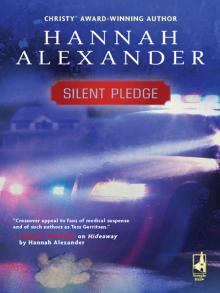 Silent Pledge
Silent Pledge Eye of the Storm
Eye of the Storm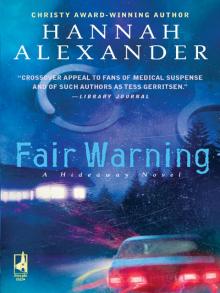 Fair Warning
Fair Warning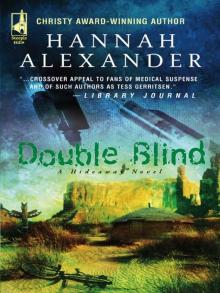 Double Blind
Double Blind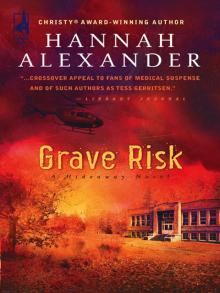 Grave Risk
Grave Risk Hideaway Home
Hideaway Home Death Benefits
Death Benefits Note of Peril
Note of Peril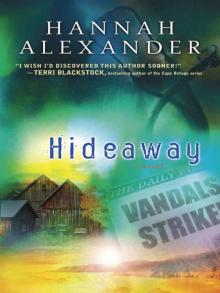 Hideaway
Hideaway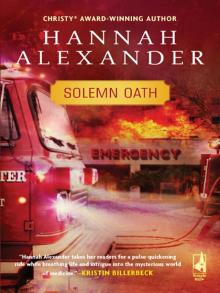 Solemn Oath
Solemn Oath The Wedding Kiss
The Wedding Kiss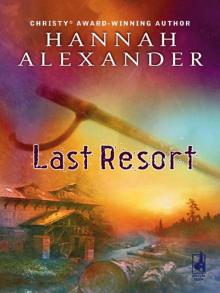 Last Resort
Last Resort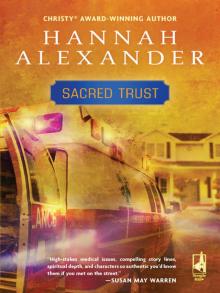 Sacred Trust
Sacred Trust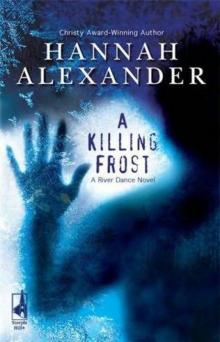 A Killing Frost
A Killing Frost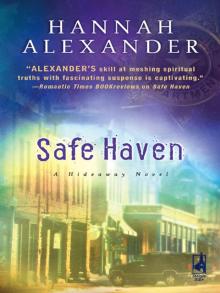 Safe Haven
Safe Haven